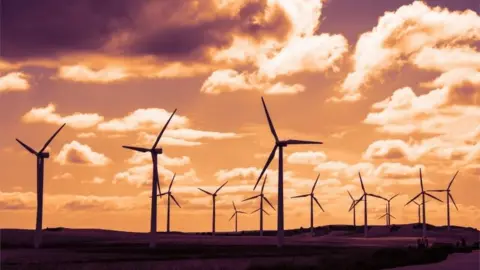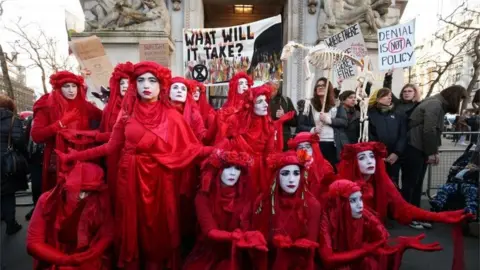Green body gives verdict on Boris Johnson carbon-cutting policies
 Getty Images
Getty ImagesThe prime minister's bold promises to protect the climate are not yet backed by policies and cash, says an end-of-year report by a think tank, Green Alliance.
It says there's a "significant gap" between Boris Johnson's world-leading plans and what's needed to meet the UK's carbon-cutting targets.
The government admits that low-carbon policies are a work in progress - but insists they will be published in coming months.
Green Alliance says current government plans add up to less than a quarter of the emissions cuts needed to achieve its 2030 climate goal.
Its report estimates that £22.7bn of additional spending will be needed to tackle the climate and nature challenge. This annual sum includes:
- £9bn on accelerating the transition to electric vehicles, and on walking, cycling, bus and rail infrastructure
- £2.3bn on making buildings efficient and kickstarting the roll-out of electric heat pumps
- £400m on establishing a resource efficiency programme for industry
- £6.6bn on nature restoration and the food and farming sector
The authors say: "During 2020 there have been many signals of intention to act on climate and nature.
"But policy and spending has fallen short of what's needed to achieve these aims. There's an immediate spending shortfall in meeting the UK's climate and nature goals to the end of this parliament in 2024."
The authors note that the UK has the chance to lead the world on climate policies at the vital global climate conference hosted by Glasgow next year. But they say: "The UK can only lead if it has its own house in order."
 PA Media
PA MediaA government spokesperson didn't deny the gaps in policy and funding but insisted that forthcoming strategies would show how carbon emissions would be reduced in every economic sector.
"Building on the prime minister's ambitious ten point plan, the recently published energy White Paper provides concrete measures to fully decarbonise our electricity system by 2050 and build back better, while ensuring reliable and affordable energy for consumers.
"This is part of a suite of bold plans across key sectors of the economy which the government will be publishing in the run up to COP26 (the Glasgow conference), culminating with a comprehensive net zero strategy."
Net zero means that any emissions not cut by 2050 will be offset by activities such as tree planting to soak up the remaining CO2.
Here are the Green Alliance's assessments:
Transport
Upside
The report congratulates the government on bringing forward the start of the phase-out of petrol and diesel cars and vans to 2030.
Ministers also provided more support for low-carbon travel, pledged funding for rail, buses, walking and cycling and have consulted on a Transport Decarbonisation Plan.
Downside
The government also invested £14bn in building new roads - and that's known to increase demand for car travel, which is incompatible with carbon targets.
Local councils need more cash to help lure people out of their cars through better walking and cycling provision. And all car makers should be ordered to sell an increasing share of zero emission vehicles each year.
Energy
Upside
The government has new targets for offshore wind capacity and renewed support for onshore wind and solar.
Downside
But will the policies get delivered? The authors say there are major obstacles in the planning system to a speedy expansion of renewables.
Industry
Upside
Carbon emissions from industry are 52% below 1990 levels and now account for just a fifth of UK emissions.
The government has pledged a "green industrial revolution" and will fund developments in hydrogen and carbon capture (where emissions from chimneys are caught and pumped into rocks underground).
Downside
Much depends on innovation funding for technologies which are not yet proven.
The report also maintains that funding should be doubled to £630m to help firms become more frugal in the materials and energy they use. A waste prevention plan has been delayed.
Buildings
Upside
Buildings account for 18% of UK carbon emissions. The government introduced the Green Homes Grant to support people to improve insulation and install clean heating such as heat pumps.
It is also consulting on efficiency standards in rental properties, and on a heat and buildings strategy.
Downside
The £1bn allocated to the Green Homes Grant next year is much less than the advisory Climate Change Committee say is needed.
There is still no long term, fully-funded strategy for upgrading housing, while 70% of UK homes do not yet meet the government's carbon reductions target.
The Land
Upside
Brexit has allowed the UK to formulate a strategy which rewards farmers for helping the environment - including offsetting carbon emissions, instead of paying farmers for the amount of land they farm.
Ministers are incentivising tree planting.
Downside
Emissions from agriculture account for 7% of UK emissions, and have remained flat since 2008. Details of new policies are awaited, and there will be a gap in environmental protection once oversight of the EU disappears.
The Green Alliance policy "scorecard" will be one of many reports into the government's low-carbon plans as ministers prepare to host the Glasgow conference and aims to lead by example.
Follow Roger on Twitter @rharrabin
